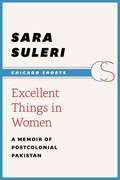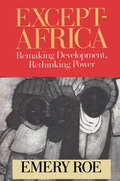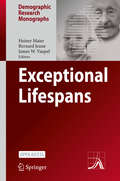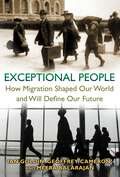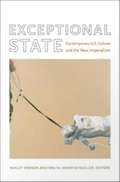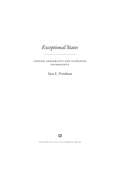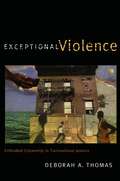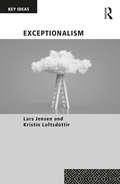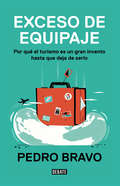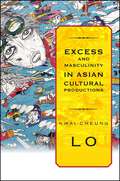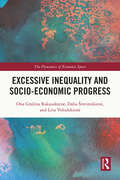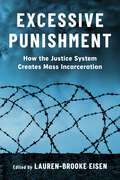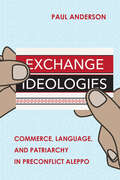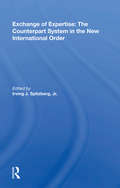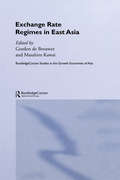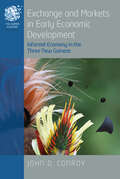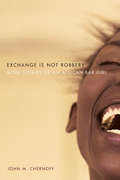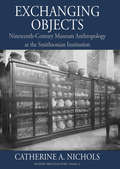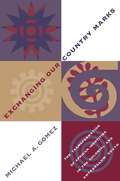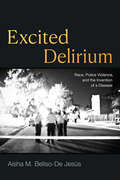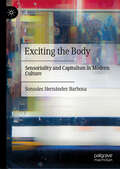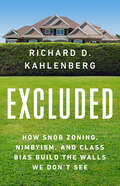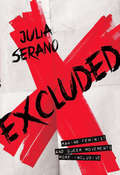- Table View
- List View
Excellent Things in Women: A Memoir of Postcolonial Pakistan (Chicago Shorts)
by Sara SuleriSometimes, only the most heartbreaking memories possess the capacity--in their elegiac immediacy--to take our breath away. With Excellent Things in Women, Sara Suleri offers the reader a delicately wrought memoir of life in postcolonial Pakistan. Suleri intertwines the violent history of Pakistan's independence with her own intimate experiences--relating the tumult of growing up female during a time of fierce change in the Middle East in the 1960s and '70s. In the two selections presented here, "Excellent Things in Women" and "Meatless Days," we watch as Suleri re-encounters the relationships that inform her voyage from adolescence to womanhood--with her Welsh mother; her Pakistani father, prominent political journalist Z. A. Suleri; and her tenacious grandmother, Dadi, along with her five siblings--as she comes to terms with the difficulties of growing up and her own complicated passage to the West.
Except-Africa: Remaking Development, Rethinking Power
by Emery RoeFirst Published in 2018. Routledge is an imprint of Taylor & Francis, an Informa company.
Exceptional Experiences: Engaging with Jolting Events in Art and Fieldwork
by Helena Wulff Petra RethmannLooking at encounters that can puncture or jolt us, this volume uses art as a lens through which to register and understand exceptional experiences. The volume also includes the fieldworker’s experience of unexpected events that can lead to key understandings, as well as revelatory moments that happen during artistic creation and while looking at art. By exploring exceptional experiences through art, the volume asks probing questions for anthropology. In recognizing that art is all-encompassing – including, as it does, narrative, performance, dance and images – Exceptional Experiences situates itself within a number of conversations on methodological and conceptual issues in anthropology and beyond.
Exceptional Lifespans (Demographic Research Monographs)
by James W. Vaupel Heiner Maier Bernard JeuneHow long can humans live? This open access book documents, verifies and brings to life the advance of the frontier of human survival. It carefully validates data on supercentenarians, aged 110+, and semi-supercentenarians, aged 105-109, stored in the International Database on Longevity (IDL). The chapters in this book contribute substantial advances in rigorously checked facts about exceptional lifespans and in the application of state-of-the-art analytical strategies to understand trends and patterns in these rare lifespans. The book includes detailed accounts of extreme long-livers and how their long lifespans were documented, as well as reports on the causes of death at the oldest ages. Its key finding, based on the analysis of 1,219 validated supercentenarians, is that the annual probability of death is constant at 50% after age 110. In contrast to previous assertions about a ceiling on the human lifespan, evidence presented in this book suggests that lifespan records in specific countries and globally will be broken again and again as more people survive to become supercentenarians.
Exceptional People: How Migration Shaped Our World and Will Define Our Future
by Ian Goldin Geoffrey Cameron Meera BalarajanThe past, present, and future role of global migrationThroughout history, migrants have fueled the engine of human progress. Their movement has sparked innovation, spread ideas, relieved poverty, and laid the foundations for a global economy. In a world more interconnected than ever before, the number of people with the means and motivation to migrate will only increase. Exceptional People provides a long-term and global perspective on the implications and policy options for societies the world over. Challenging the received wisdom that a dramatic growth in migration is undesirable, the book proposes new approaches for governance that will embrace this international mobility.The authors explore the critical role of human migration since humans first departed Africa some fifty thousand years ago—how the circulation of ideas and technologies has benefited communities and how the movement of people across oceans and continents has fueled economies. They show that migrants in today's world connect markets, fill labor gaps, and enrich social diversity. Migration also allows individuals to escape destitution, human rights abuses, and repressive regimes. However, the authors indicate that most current migration policies are based on misconceptions and fears about migration's long-term contributions and social dynamics. Future policies, for good or ill, will dramatically determine whether societies can effectively reap migration's opportunities while managing the risks of the twenty-first century.A guide to vigorous debate and action, Exceptional People charts the past and present of international migration and makes practical recommendations that will allow everyone to benefit from its unstoppable future growth.
Exceptional State: Contemporary U.S. Culture and the New Imperialism
by Ashley Dawson Malini Johar SchuellerExceptional State analyzes the nexus of culture and contemporary manifestations of U. S. imperialism. The contributors, established and emerging cultural studies scholars, define culture broadly to include a range of media, literature, and political discourse. They do not posit September 11, 2001 as the beginning of U. S. belligerence and authoritarianism at home and abroad, but they do provide context for understanding U. S. responses to and uses of that event. Taken together, the essays stress both the continuities and discontinuities embodied in a present-day U. S. imperialism constituted through expressions of millennialism, exceptionalism, technological might, and visions of world dominance. The contributors address a range of topics, paying particular attention to the dynamics of gender and race. Their essays include a surprising reading of the ostensibly liberal movies Wag the Dog and Three Kings, an exploration of the rhetoric surrounding the plan to remake the military into a high-tech force less dependent on human bodies, a look at the significance of the popular Left Behind series of novels, and an interpretation of the Abu Ghraib prison photos. They scrutinize the national narrative created to justify the U. S. invasions of Afghanistan and Iraq, the ways that women in those countries have responded to the invasions, the contradictions underlying calls for U. S. humanitarian interventions, and the role of Africa in the U. S. imperial imagination. The volume concludes on a hopeful note, with a look at an emerging anti-imperialist public sphere. Contributors. Omar Dahbour, Ashley Dawson, Cynthia Enloe, Melani McAlister, Christian Parenti, Donald E. Pease, John Carlos Rowe, Malini Johar Schueller, Harilaos Stecopoulos
Exceptional States
by Sara L. FriedmanExceptional States examines new configurations of marriage, immigration, and sovereignty emerging in an increasingly mobile Asia where Cold War legacies continue to shape contemporary political struggles over sovereignty and citizenship. Focused on marital immigration from China to Taiwan, the book documents the struggles of these women and men as they seek acceptance and recognition in their new home. Through tracing parallels between the predicaments of Chinese marital immigrants and the uncertain future of the Taiwan nation-state, the book shows how intimate attachments and emotional investments infuse the governmental practices of Taiwanese bureaucrats charged with regulating immigration and producing citizenship and sovereignty. Its attention to a group of immigrants whose exceptional status has become necessary to Taiwan's national integrity exposes the social, political, and subjective consequences of life on the margins of citizenship and sovereignty.
Exceptional Violence: Embodied Citizenship in Transnational Jamaica
by Deborah A. ThomasExceptional Violence is a sophisticated examination of postcolonial state formation in the Caribbean, considered across time and space, from the period of imperial New World expansion to the contemporary neoliberal era, and from neighborhood dynamics in Kingston to transnational socioeconomic and political fields. Deborah A. Thomas takes as her immediate focus violence in Jamaica and representations of that violence as they circulate within the country and abroad. Through an analysis encompassing Kingston communities, Jamaica's national media, works of popular culture, notions of respectability, practices of punishment and discipline during slavery, the effects of intensified migration, and Jamaica's national cultural policy, Thomas develops several arguments. Violence in Jamaica is the complicated result of a structural history of colonialism and underdevelopment, not a cultural characteristic passed from one generation to the next. Citizenship is embodied; scholars must be attentive to how race, gender, and sexuality have been made to matter over time. Suggesting that anthropologists in the United States should engage more deeply with history and political economy, Thomas mobilizes a concept of reparations as a framework for thinking, a rubric useful in its emphasis on structural and historical lineages.
Exceptionalism: Exceptionalism, Migrant Others And National Identities (Key Ideas)
by Lars Jensen Kristín LoftsdóttirThis volume crucially provides an analytical and comparative approach, investigating the meaning and uses of the concept of exceptionalism, while demonstrating the ways in which it manifests itself in different historical and geographical settings. Exceptionalism offers comparative case studies from different parts of the world, showcasing the way in which exceptionalism has come to occupy an important narrative position in relation to different nation-states, including the United States, the United Kingdom, the Nordic countries, various European nations and countries in Latin America, Africa and Asia. An introduction to and overview of a term that has come to define the past and present identity of many nations, this book will appeal to scholars of sociology, anthropology, geography, cultural studies and politics.
Exceso de equipaje: Por qué el turismo es un gran invento hasta que deja de serlo
by Pedro BravoUna serie de historias cruzadas sobre el turismo y su evolución en los últimos tiempos. De repente, en el país que presume de ser el mejor destino turístico del mundo ha surgido un movimiento de rechazo a su industria más próspera. Los españoles viajamos cada vez más pero también empezamos a darnos cuenta de los defectos que se ocultan al otro lado de la postal. ¿Qué ha pasado? ¿De dónde sale la turismofobia? ¿No estábamos todos de acuerdo en que el turismo era una actividad rentable, simpática y limpia? En todo el mundo, no solo en España, han surgido voces críticas y se han organizado protestas; la gente rechaza ver cómo su vida recibe el impacto de un negocio al que parece que se le permite todo. Un negocio que cambia, crece y se extiende a toda velocidad gracias a la tecnología y a las contradicciones de los territorios que lo sufren sin dejar de potenciarlo. El turismo genera empleo pero este es precario y estacional.El turismo aporta músculo a la macroeconomía pero afecta cada vez más el mercado de la vivienda. El turismo es una oportunidad para el encuentro pero puede devenir en invasión. Y, sí, es muy contaminante. ¿Cómo hemos llegado hasta aquí? ¿Cuáles son las claves del sector? ¿Cuáles son sus beneficios? ¿Cuánto turismo es suficiente y cuánto es demasiado? ¿Cómo nos afecta? ¿Se puede hacer de otra manera? ¿Se puede viajar de otro modo? De todo esto trata Exceso de equipaje, algo así como una guía turística por el negocio turístico.
Excess and Masculinity in Asian Cultural Productions (SUNY series in Global Modernity)
by Kwai-Cheung LoIn Excess and Masculinity in Asian Cultural Productions, Kwai-Cheung Lo explores the excesses associated with the phenomenal economic growth in East Asia, including surplus capital, environmental waste, and the unbalanced ratio of men to women in the region, connecting the production of capitalist "excess" to the production of new forms of transnational Asian masculinity. Lo draws on Lacanian psychoanalysis and Marxist ideas as well as gender theory in his examination of East Asian cultural products such as religious and parenting books, transgender literary fantasies, travel writing, gangster movies, female action heroes, and online games. Through this analysis, Lo argues that the excess of Asia's "masculine" modernization throws into relief the internal inconsistencies of capitalism itself, posing new challenges to the order of global capitalism and suggesting new possible configurations of global modernity.
Excessive Inequality and Socio-Economic Progress (The Dynamics of Economic Space)
by Dalia Štreimikienė Ona Gražina Rakauskienė Lina VolodzkienėThe growing inequality in the global economy across the planet is reaching unprecedented levels. This book seeks to develop frameworks for the assessment of excessive inequality and its impact on social-economic progress and sustainable development. It begins by summarizing the theoretical approaches of economic inequality, its specificity, and questioning what economic inequality really is and how it progresses. Next, the book explores issues of methodology for addressing the growing excessive economic inequality. It then applies these concepts to examine inequality across a range of the European Union (EU) countries. A variety of factors are considered, such as the impact of economic inequality on socio-economic progress, when normal inequality turns into excessive inequality, and its impact on economic growth, quality of life, and the environmental sustainability across different groups.
Excessive Punishment: How the Justice System Creates Mass Incarceration
by Lauren-Brooke EisenThe United States has by far the world’s largest population of incarcerated people. More than a million Americans are imprisoned; hundreds of thousands more are held in jails. This vast system has doled out punishment—particularly to people from marginalized groups—on an unfathomable scale. At the same time, it has manifestly failed to secure public safety, instead perpetuating inequalities and recidivism. Why does the United States see punishment as the main response to social harm, and what are the alternatives?This book brings together essays by scholars, practitioners, activists, and writers, including incarcerated and formerly incarcerated people, to explore the harms of this punitive approach. The chapters address a range of issues, from policing to prosecution, and from how people are treated in prison to the consequences of a criminal conviction. Together, they consider a common theme: We cannot reduce our dependence on mass incarceration until we confront our impulse to punish in ways that are excessive, often wildly disproportionate to the harm caused. Essays trace how a maze of local, state, and federal agencies have contributed to mass incarceration and deterred attempts at reform. They shed light on how the excesses of America’s criminal legal system are entwined with poverty, racism, and the legacy of slavery. A wide-ranging and powerful look at the failures of the status quo, Excessive Punishment also considers how to reimagine the justice system to support restoration instead of retribution.
Exchange Ideologies: Commerce, Language, and Patriarchy in Preconflict Aleppo
by Paul AndersonExchange Ideologies documents the social world of Aleppo's traders before the destruction of the city, exploring changing conceptions of commerce in Syria. Syria's traders have been seen as embodying a timeless culture of "the bazaar," or an ahistorical Islamic culture of trade. Other accounts portray them as venal figures, motivated only by profit, and commerce as a purely instrumental pursuit. Rejecting both approaches, Paul Anderson traces the diverse social structures, and notions of language, through which Aleppo's merchants understood and construed commerce and the figure of the merchant during a period of economic liberalization in the 2000s. Rather than seeing these social structures and representations as expressions of a timeless bazaar culture, or as shaped only by Islamic tradition, Exchange Ideologies relates them to processes of politically managed economic liberalization and the Syrian regime's attempts to ensure its own survival in the midst of change. In doing so, Anderson provides an account of economic liberalization in Syria as a social and cultural process as much as a political and economic one.
Exchange Of Expertise/h: The Counterpart System In The New International Order
by Irving J. SpitzbergThe vision of the New International Order emphasizes justice and equality. It also raises profound questions about the nature and future of the relationship between postindustrial and Third World countries. The counterpart system describes one aspect of this relationship: an expert from a postindustrial country teaches a special skill to a Third World national. In this collection contributors draw on political science, economics, education, sociology, history, and communications theory to illuminate the forces that shape the nature of the exchange of expertise between postindustrial and Third World countries. Each author raises theoretical points and offers practical observations about the future of this exchange—a critical point of contact--in the New International Order.
Exchange Rate Regimes in East Asia (Routledge Studies in the Growth Economies of Asia)
by Masahiro Kawai Gordon De BrouwerThere is a deepening debate in East Asia about the prospects for common exchange rate arrangements, even including the formation of a common currency in the longer term. This raises a complex set of issues and this volume provides a detailed yet comprehensive examination of key issues in the debate. It looks, for example, at the nature and extent of linkages in East Asia, in terms of trade and foreign investment, finance, labour, and consumption, investment and output. It examines how the exchange rate affects various aspects of economies. And it critically analyzes various proposals for currency regimes for the region, including floating exchange rates, basket pegs, and currency union.
Exchange and Markets in Early Economic Development: Informal Economy in the Three New Guineas (The Human Economy #10)
by John D. ConroyThe idea of an informal economy emerged from, and is a critique of, the ideology of ‘economic development’. It originated from Keith Hart’s recognition of informal economic activity in 1960s Ghana. In the context of four colonialisms – German, British, Australian and Dutch – this book recounts Hart’s effort in 1972 to introduce the informal ‘sector’ into development planning in Papua New Guinea. This was problematic, because ‘the market’ was scarcely institutionalized, and traditional modes of exchange persisted stubbornly. Rather than conforming with post-colonial economic ideology, the subjected people pushed back against imposed bureaucracy to practice informal and hybrid modes of economic activity.
Exchange is not Robbery: More Stories of an African Bar Girl
by John M. ChernoffWhile living in West Africa in the 1970s, John Chernoff recorded the stories of "Hawa," a spirited and brilliant but uneducated woman whose insistence on being respected and treated fairly propelled her, ironically, into a life of marginality and luck as an "ashawo," or bar girl. Rejecting traditional marriage options and cut off from family support, she is like many women in Africa who come to depend on the help they receive from one another, from boyfriends, and from the men they meet in bars and nightclubs. Refusing to see herself as a victim, Hawa embraces the freedom her lifestyle permits and seeks the broadest experience available to her. In Exchange Is Not Robbery and its predecessor, Hustling Is Not Stealing, a chronicle of exploitation is transformed by verbal art into an ebullient comedy. In Hustling Is Not Stealing, Hawa is a playful warrior struggling against circumstances in Ghana and Togo. In Exchange Is Not Robbery, Hawa returns to her native Burkina Faso, where she achieves greater control over her life but faces new difficulties. As a woman making sacrifices to live independently, Hawa sees her own situation become more complex as she confronts an atmosphere in Burkina Faso that is in some ways more challenging than the one she left behind, and the moral ambiguities of her life begin to intensify. Combining elements of folklore and memoir, Hawa's stories portray the diverse social landscape of West Africa. Individually the anecdotes can be funny, shocking, or poignant; assembled together they offer a sweeping critical and satirical vision.
Exchanging Objects: Nineteenth-Century Museum Anthropology at the Smithsonian Institution (Museums and Collections #12)
by Catherine A. NicholsAs an historical account of the exchange of “duplicate specimens” between anthropologists at the Smithsonian Institution and museums, collectors, and schools around the world in the late nineteenth century, this book reveals connections between both well-known museums and little-known local institutions, created through the exchange of museum objects. It explores how anthropologists categorized some objects in their collections as “duplicate specimens,” making them potential candidates for exchange. This historical form of what museum professionals would now call deaccessioning considers the intellectual and technical requirement of classifying objects in museums, and suggests that a deeper understanding of past museum practice can inform mission-driven contemporary museum work.
Exchanging Objects: Nineteenth-Century Museum Anthropology at the Smithsonian Institution (Museums and Collections)
by Catherine A. NicholsAs an historical account of the exchange of “duplicate specimens” between anthropologists at the Smithsonian Institution and museums, collectors, and schools around the world in the late nineteenth century, this book reveals connections between both well-known museums and little-known local institutions, created through the exchange of museum objects. It explores how anthropologists categorized some objects in their collections as “duplicate specimens,” making them potential candidates for exchange. This historical form of what museum professionals would now call deaccessioning considers the intellectual and technical requirement of classifying objects in museums, and suggests that a deeper understanding of past museum practice can inform mission-driven contemporary museum work.
Exchanging Our Country Marks
by Michael A. GomezThe transatlantic slave trade brought individuals from diverse African regions and cultures to a common destiny in the American South. In this comprehensive study, Michael Gomez establishes tangible links between the African American community and its African origins and traces the process by which African populations exchanged their distinct ethnic identities for onedefined primarily by the conception of race. He examines transformations in the politics, social structures, and religions of slave populations through 1830, by which time the contours of a new African American identity had begun to emerge.After discussing specific ethnic groups in Africa, Gomez follows their movement to North America, where they tended to be amassed in recognizable concentrations within individual colonies (and, later, states). For this reason, he argues, it is possible to identify particular ethnic cultural influences and ensuing social formations that heretofore have been considered unrecoverable. Using sources pertaining to the African continentas well as runaway slave advertisements, ex-slave narratives, and folklore, Gomez reveals concrete and specific links between particular African populations and their North American progeny, thereby shedding new light on subsequent African American social formation.
Excited Delirium: Race, Police Violence, and the Invention of a Disease
by Aisha M. Beliso-De JesúsIn 1980, Charles Wetli---a Miami-based medical examiner and self-proclaimed “cult expert” of Afro-Caribbean religions---identified what he called “excited delirium syndrome.” Soon, medical examiners began using the syndrome regularly to describe the deaths of Black men and women during interactions with police. Police and medical examiners claimed that Black people with so-called excited delirium exhibited superhuman strength induced from narcotics abuse. It was fatal heart failure that killed them, examiners said, not forceful police restraints. In Excited Delirium, Aisha M. Beliso-De Jesús examines this fabricated medical diagnosis and its use to justify and erase police violence against Black and Brown communities. Exposing excited delirium syndrome’s flawed diagnostic criteria, she outlines its inextricable ties to the criminalization of Afro-Latiné religions. Beliso-De Jesús demonstrates that it is yet a further example of the systemic racism that pervades law enforcement in which the culpability for state violence is shifted from the state onto its victims. In so doing, she furthers understanding of the complex layers of medicalized state-sanctioned violence against people of color in the United States.
Exciting the Body: Sensoriality and Capitalism in Modern Culture
by Sonsoles Hernández BarbosaThis book uncovers how during the origins of modernity in the nineteenth century the senses were mobilised to sell more, both through the popularisation of objects aimed at the senses (such as panoramas, optical boxes, automatons, music boxes and pianolas), and also through marketing mechanisms (for example, advertising and window dressing). All these novel objects and spaces had one thing in common: the aim of attracting the public by stimulating the senses. By examining practices that mobilised the senses in the emerging fields of advertising, marketing and the leisure industry, and through an approach that involves elements from the history of the senses, visual studies, sound studies and aesthetics, this book explores what this new sensory-driven mass culture was all about. The basis of English translation of this book, originally in Spanish Vidas excitadas. Sensorialidad y capitalismo en la cultura moderna (2022), was facilitated by artificial intelligence. The author, with the support of Lucille Banham, has subsequently revised the text further in an endeavour to refine the work stylistically.
Excluded: How Snob Zoning, NIMBYism, and Class Bias Build the Walls We Don't See
by Richard D KahlenbergAn indictment of America's housing policy that reveals the social engineering underlying our segregation by economic class, the social and political fallout that result, and what we can do about it The last, acceptable form of prejudice in America is based on class and executed through state-sponsored economic discrimination, which is hard to see because it is much more subtle than raw racism. While the American meritocracy officially denounces prejudice based on race and gender, it has spawned a new form of bias against those with less education and income. Millions of working-class Americans have their opportunity blocked by exclusionary snob zoning. These government policies make housing unaffordable, frustrate the goals of the civil rights movement, and lock in inequality in our urban and suburban landscapes. Through moving accounts of families excluded from economic and social opportunity as they are hemmed in through &“new redlining&” that limits the type of housing that can be built, Richard Kahlenberg vividly illustrates why America has a housing crisis. He also illustrates why economic segregation matters since where you live affects access to transportation, employment opportunities, decent health care, and good schools. He shows that housing choice has been socially engineered to the benefit of the affluent, and, that astonishingly the most restrictive zoning is found in politically liberal cities where racial views are more progressive. Despite this there is hope. Kahlenberg tells the inspiring stories of growing number of local and national movements working to tear down the walls that inflicts so much damage on the lives of millions of Americans.
Excluded: Making Feminist and Queer Movements More Inclusive
by Julia SeranoWhile many feminist and queer movements are designed to challenge sexism, they often simultaneously police gender and sexuality-sometimes just as fiercely as the straight, male-centric mainstream does. Among LGBTQ activists, there is a long history of lesbians and gay men dismissing bisexuals, transgender people, and other gender and sexual minorities. In each case, exclusion is based on the premise that certain ways of being gendered or sexual are more legitimate, natural, or righteous than others.As a trans woman, bisexual, and femme activist, Julia Serano has spent much of the last ten years challenging various forms of exclusion within feminist and queer/LGBTQ movements. In Excluded, she chronicles many of these instances of exclusion and argues that marginalizing others often stems from a handful of assumptions that are routinely made about gender and sexuality. These false assumptions infect theories, activism, organizations, and communities-and worse, they enable people to vigorously protest certain forms of sexism while simultaneously ignoring and even perpetuating others. Serano advocates for a new approach to fighting sexism that avoids these pitfalls and offers new ways of thinking about gender, sexuality, and sexism that foster inclusivity rather than exclusivity.
